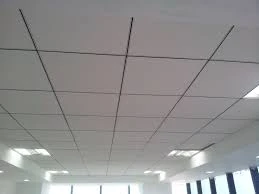Nov . 11, 2024 03:35 Back to list
Specifications for Mineral Fiber Ceiling Tile Materials and Performance Standards
The Specifications of Mineral Fiber Ceiling Tiles A Comprehensive Guide
Mineral fiber ceiling tiles have become an integral component in modern construction, particularly in commercial and institutional buildings. Known for their excellent acoustic properties and versatility, these tiles are made from a combination of materials such as mineral wool, fiberglass, and other natural fibers. This article delves into the specifications of mineral fiber ceiling tiles, shedding light on their features, benefits, and applications.
Composition and Manufacturing
Mineral fiber ceiling tiles are primarily composed of natural minerals, such as gypsum, clay, and perlite, along with synthetic fibers. The production process typically involves a combination of high-temperature processes and the use of binding agents to create a strong, lightweight board. This manufacturing process results in tiles that are not only durable but also resistant to moisture and mold growth.
Size and Thickness
One of the critical specifications of mineral fiber ceiling tiles is their sizes and thicknesses. These tiles typically come in standard dimensions, including 2x2 feet and 2x4 feet, making them suitable for most grid systems. The thickness of these tiles can vary, generally ranging from 0.5 inches to 1 inch. Thicker tiles usually offer better sound absorption and insulation properties, making them popular in environments where reducing noise is essential.
Acoustic Performance
The acoustic performance of mineral fiber ceiling tiles is one of their standout features. These tiles are designed to enhance sound quality within a space by absorbing sound waves, thereby minimizing echoes and reverberation. The Noise Reduction Coefficient (NRC) ratings for mineral fiber tiles typically range from 0.50 to 0.90, indicating their effectiveness in sound absorption. Higher NRC values signify better performance, making these tiles ideal for environments such as offices, classrooms, and theaters.
Fire Resistance
mineral fibre ceiling tiles specifications

Another critical specification to consider is fire resistance. Mineral fiber ceiling tiles are often classified as Class A building materials, which means they have a low flame spread rating and can resist ignition. This fire-resistant quality makes mineral fiber tiles a preferred choice in commercial buildings where safety regulations are stringent. Many products undergo tests in accordance with ASTM (American Society for Testing and Materials) standards to ensure compliance with fire safety regulations.
Moisture Resistance
Moisture resistance is vital in areas prone to high humidity, such as kitchens and bathrooms. Many mineral fiber ceiling tiles come with a specially designed moisture-resistant surface, which prevents sagging and mold growth. It is crucial to check the humidity rating of the tiles, as some tiles are better suited for damp environments than others. Selecting a tile with a good moisture resistance rating can significantly enhance the lifespan of the ceiling installation.
Aesthetic Options
Mineral fiber ceiling tiles are available in various finishes, textures, and colors, contributing to the overall design aesthetic of a space. From smooth white surfaces to textured or patterned options, these tiles can be customized to match the interior design concept. This versatility allows architects and designers to create attractive ceilings without compromising functionality.
Installation and Maintenance
The installation of mineral fiber ceiling tiles is generally straightforward, requiring standard grid systems for support. These tiles can be easily laid into place, making them suitable for DIY projects as well as professional installations. Maintenance is relatively low; periodic cleaning with a damp cloth or vacuuming is typically sufficient. However, caution should be exercised not to damage the tiles during cleaning.
Conclusion
Mineral fiber ceiling tiles offer a compelling combination of sound absorption, fire resistance, moisture resistance, and aesthetic flexibility. Understanding their specifications is crucial for making informed choices that align with the functional and design requirements of different spaces. As such, they remain a popular choice among architects, builders, and property owners seeking to balance performance with style in their construction projects. Whether for a corporate office, a school, or a retail environment, mineral fiber ceiling tiles can enhance both the comfort and appearance of interior spaces.
-
Durable Ceiling T Grid Systems | Easy InstallationNewsAug.29,2025
-
PVC Gypsum Ceiling: Durable, Laminated Tiles for Modern SpacesNewsAug.28,2025
-
Pvc Gypsum Ceiling Is DurableNewsAug.21,2025
-
Mineral Fiber Board Is DurableNewsAug.21,2025
-
Ceiling Tile Clip Reusable DesignNewsAug.21,2025
-
Ceiling T Grid Modular DesignNewsAug.21,2025







